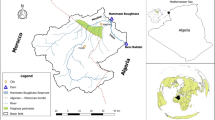Abstract
Hydropower is a low-carbon energy source, which may be adversely impacted by climate change. This work applies the Grasshopper Optimization Algorithm (GOA) to optimize hydropower multi-reservoir systems. Performance of GOA is compared with that of particle swarm optimization (PSO). GOA is applied to hydropower, three-reservoir system (Seymareh, Sazbon, and Karkheh), located in the Karkheh basin (Iran) for baseline period 1976–2005 and two future periods (2040–2069) and (2070–2099) under greenhouse gases pathway scenarios RCP2.6, RCP4.5, and RCP8.5. GOA minimizes the shortage of hydropower energy generation. Results from GOA optimization of Seymareh reservoir show that average objective function in baseline is 85 and minimum value of average objective function in 2040–2069 would be under RCP2.6 (equal to 0.278). Optimization of Seymareh-reservoir based on PSO shows that average value of objective function in baseline is less (that is, better) than value obtained with GOA (10.953). Optimization results for two-reservoir system (Sazbon and Karkheh) based on GOA optimization show that objective function in baseline is 5.44 times corresponding value obtained with PSO, standard deviation is 2.3 times that calculated with PSO, and run-time is 1.5 times PSO’s. Concerning three-reservoir systems it was determined that objective function based on PSO had the best value (the lowest energy deficit), especially in future. GOA converges close to the best objective function, especially in future-periods optimization, and convergence to solutions is more stable than PSO’s. A comparison of performance of GOA and PSO indicates PSO converges faster to optimal solution, and produces better objective function than GOA.







Similar content being viewed by others
Availability of Data and Materials
Authors have restrictions on sharing data.
References
Ahmadianfar I, Samadi-Koucheksaraee A, Bozorg-Haddad O (2017) Extracting optimal policies of hydropower multi-reservoir systems utilizing enhanced differential evolution algorithm. Water Resour Manag 31(14):4375–4397
Ahmadianfar I, Bozorg-Haddad O, Chu X (2019) Optimizing multiple linear rules for multi-reservoir hydropower systems using an optimization method with an adaptation strategy. Water Resour Manag 33:4265–4286
Ashofteh P-S, Bozorg-Haddad O, Loáiciga HA (2021) Application of bi-objective genetic programming (BO-GP) for optimizing irrigation rules using two reservoir performance criteria. Int J River Basin Manag. https://doi.org/10.1080/15715124.2019.1613415
Azadi F, Ashofteh P-S, Shokri A, Loáiciga HA (2021) Simulation-optimization of reservoir water quality under climate change. J Water Resour Plan Manag 147(9):04021054
Bozorg-Haddad O, Hosseini-Moghari SM, Loáiciga HA (2016) Biogeography-based optimization algorithm for optimal operation of reservoir systems. J Water Resour Plan Manag 142(1):04015034
Bozorg-Haddad O, Garousi-Nejad I, Loaiciga HA (2017) Extended multi-objective firefly algorithm for hydropower energy generation. J Hydroinform 19(5):734–751
Chang J, Wang X, Li Y, Wang Y, Zhang H (2018) Hydropower plant operation rules optimization response to climate change. Energy 160:886–897
Fallah-Mehdipour E, Bozorg-Haddad O, Loaiciga HA (2018) Calculation of multi-objective optimal tradeoffs between environmental flows and hydropower generation. Environ Earth Sci 77:453. https://doi.org/10.1007/s12665-018-7645-6
Fang R, Popole Z (2020) Multi-objective optimized scheduling model for hydropower reservoir based on improved particle swarm optimization algorithm. Environ Sci Pollut Res 27(12):12842–12850
Feng ZK, Liu S, Niu WJ, Li BJ, Wang WC, Luo B, Miao SM (2020) A modified sine cosine algorithm for accurate global optimization of numerical functions and multiple hydropower reservoirs operation. Knowl-Based Syst 208:106461
Garousi-Nejad I, Bozorg-Haddad O, Loáiciga HA (2016a) Modified firefly algorithm for solving multireservoir operation in continuous and discrete domains. J Water Resour Plan Manag 142(9):04016029
Garousi-Nejad I, Bozorg-Haddad O, Loáiciga HA, Mariño MA (2016b) Application of the firefly algorithm to optimal operation of reservoirs with the purpose of irrigation supply and hydropower production. J Irrig Drain Eng 142(10):04016041
Golfam P, Ashofteh P-S, Loáiciga HA (2021) Modeling adaptation policies to increase the synergies of water-climate-agriculture nexus under climate change. Environ Dev 37:100612. https://doi.org/10.1016/j.envdev.2021.100612
Hosseini-Moghari SM, Morovati R, Moghadas M, Araghinejad S (2015) Optimum operation of reservoir using two evolutionary algorithms: imperialist competitive algorithm (ICA) and cuckoo optimization algorithm (COA). Water Resour Manag 29(10):3749–3769
Jahandideh-Tehrani M, Bozorg-Haddad O, Loáiciga HA (2020) Application of particle swarm optimization to water management: an introduction and overview. Environ Monit Assess 192(5):1–18
Kennedy J, Eberhart R (1995) Particle swarm optimization. In: Proceedings of ICNN'95-international conference on neural networks. IEEE 4:1942–1948
Khalifeh S, Esmaili K, Khodashenas S, Akbarifard S (2020) Data on optimization of the non-linear Muskingum flood routing in Kardeh River using Goa algorithm. Data Brief 30:105398
Saremi Sh, Mirjalili S, Lewis A (2017) Grasshopper optimisation algorithm: theory and application. Adv Eng Softw 105:30–47
Sarzaeim P, Bozorg-Haddad O, Zolghadr-Asli B, Fallah-Mehdipour E, Loáiciga HA (2018) Optimization of run-of-river hydropower plant design under climate change conditions. Water Resour Manag 32(12):3919–3934
Xu Y, Mei Y (2018) A modified water cycle algorithm for long-term multi-reservoir optimization. Appl Soft Comput 71:317–332
Zeynali MJ, Shahidi A (2018) Performance assessment of grasshopper optimization algorithm for optimizing coefficients of sediment rating curve. AUT J Civ Eng 2(1):39–48
Zhang X, Liu P, Xu C-Y, Guo Sh, Gong Y, Li H (2019) Derivation of hydropower rules for multireservoir systems and its application for optimal reservoir storage allocation. J Water Resour Plan Manag 145(5):04019010
Funding
Not applicable.
Author information
Authors and Affiliations
Contributions
KR developed theory and performed computations. P-SA verified analytical methods and encouraged KR to investigate specific aspects. P-SA supervised findings of this work, and HL helped supervise project. All authors discussed results and contributed to final manuscript. KR wrote manuscript with support from P-SA, and especially HL. P-SA conceived original idea.
Corresponding author
Ethics declarations
Conflict of interest
All authors declare that they have no conflict of interest.
Additional information
Publisher's Note
Springer Nature remains neutral with regard to jurisdictional claims in published maps and institutional affiliations.
Rights and permissions
About this article
Cite this article
Rahmati, K., Ashofteh, PS. & Loáiciga, H.A. Application of the Grasshopper Optimization Algorithm (GOA) to the Optimal Operation of Hydropower Reservoir Systems Under Climate Change. Water Resour Manage 35, 4325–4348 (2021). https://doi.org/10.1007/s11269-021-02950-z
Received:
Accepted:
Published:
Issue Date:
DOI: https://doi.org/10.1007/s11269-021-02950-z




